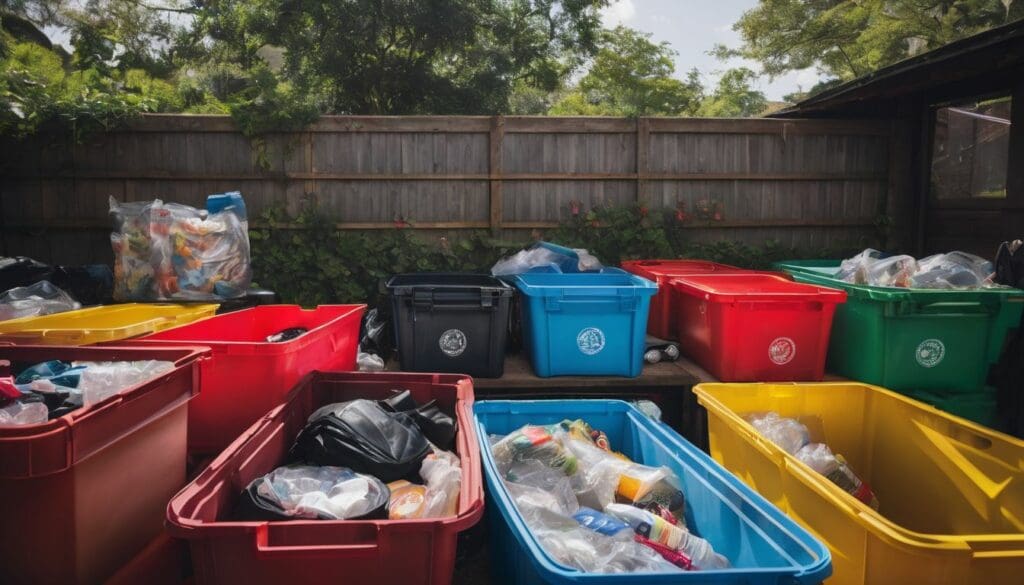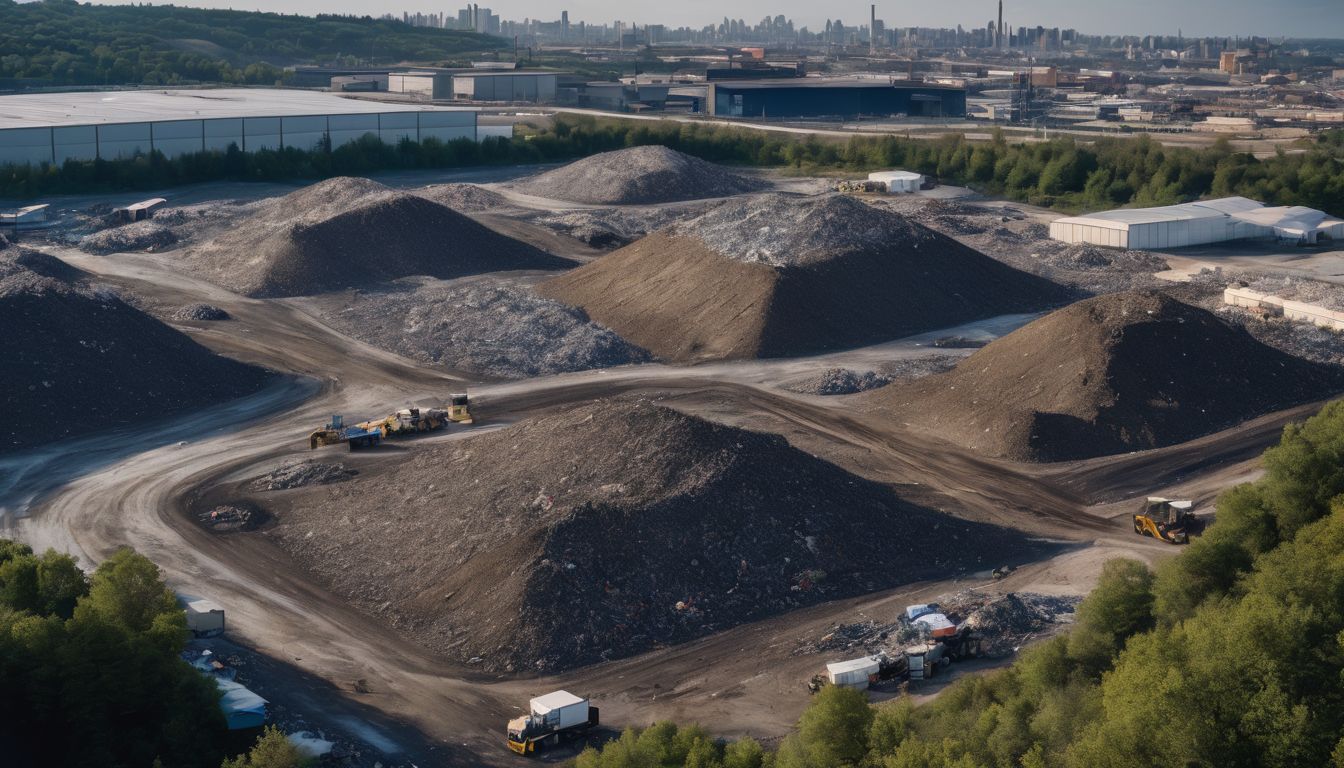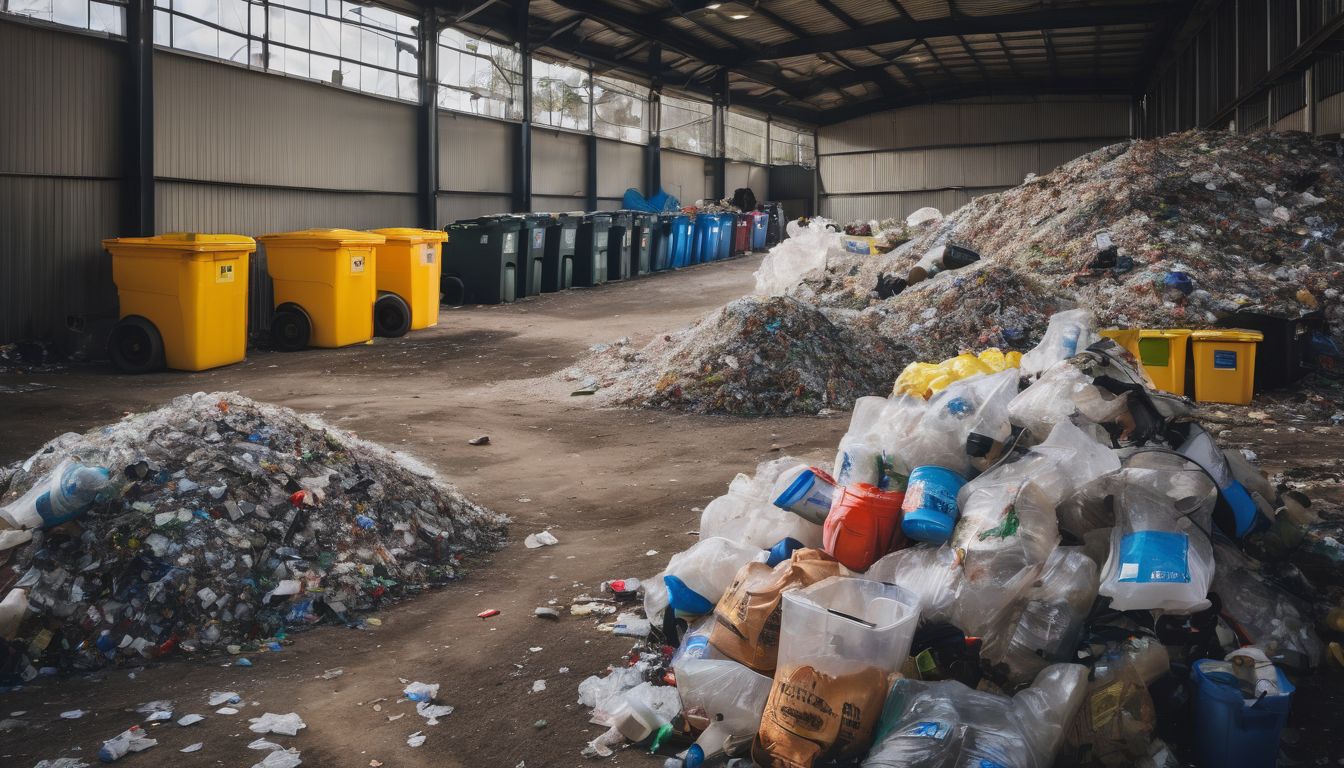Recycling confusion is a common struggle in many communities. Did you know, effective recycling education can increase recycling rates by over 30%? Our guide will provide proven strategies to boost your local recycling program and involve everyone.
Let’s create a greener community together!
Key Takeaways
- Educating the public about recycling can lead to a significant rise in recycling rates, with potential increases of over 30%.
- Collaborations between communities and local governments help establish successful recycling programs and create teams dedicated to environmental stewardship.
- Social media is a powerful tool for engaging community members, sharing information on sustainable practices, and fostering a collective approach to reducing waste.
- Incentives such as vouchers or discounts are effective in motivating individuals within the community to participate in recycling efforts enthusiastically.
- Experiential learning activities like interactive workshops and visits to recycling facilities encourage hands-on involvement and deepen understanding of the importance of eco-friendly behaviours.
Why Community Education on Recycling is Important
Community education on recycling is essential as it improves recycling rates, reduces waste in landfills, and decreases pollution and greenhouse gas emissions. These initiatives play a critical role in promoting sustainable living practices within local communities.
Improves recycling rates
Educating people about recycling dramatically increases the number of individuals who recycle regularly. It turns everyday waste into valuable resources and cuts down on the amount sent to landfill.
Public education on waste management spells out which materials can be recycled, how to sort them correctly, and why it matters. When citizens understand the benefits of recycling, they become active participants in community recycling programmes.
Effective environmental education encourages sustainable practices by highlighting their impact on a sustainable future. Experiential learning through hands-on sorting activities or visiting recycling facilities can have a lasting effect.
People are more likely to adopt green living habits when they witness the transformation of recyclables first-hand. Promote recycling at every opportunity so that ecofriendly behaviours become second nature in our communities, paving the way for higher recycling rates and environmental stewardship among residents.
Reduces waste in landfills
Recycling reduces waste in landfills and minimises the environmental impact of overflowing dumpsites. By diverting recyclable materials from ending up in landfills, we can reduce the strain on our local waste management systems while positively impacting our communities.
Promoting recycling initiatives and educating communities about the benefits of reducing waste not only helps conserve resources but also contributes to a healthier environment for all.
Encouraging eco-friendly practices, such as recycling, is vital for creating sustainable and resilient communities. Increasing community awareness about the importance of reducing waste is a crucial step towards building greener neighbourhoods where environmental conservation thrives.
Decreases pollution and greenhouse gas emissions
Decreasing pollution and greenhouse gas emissions is a crucial benefit of community recycling efforts. By encouraging sustainable practices in local areas and promoting green initiatives, communities can significantly reduce their environmental impact.
Engaging residents through recycling education and providing incentives for eco-friendly behaviors will further contribute to waste reduction and ultimately lead to cleaner air and a healthier planet.
Encouraging ecofriendly practices in communities by increasing awareness about the benefits of recycling will ultimately lead to less pollution and emission of greenhouse gases. Community outreach for recycling plays a vital role in educating the public on environmentally friendly behaviours, which promotes an overall reduction in the ecological footprint of local neighbourhoods.
Best Approaches for Community Recycling Education
Partnering with local government to establish recycling goals and create a dedicated recycling team. Providing education materials and resources to facilitate community-wide knowledge on the importance of recycling.
Partnering with local government
Local government partnerships are essential in promoting recycling initiatives within communities. Collaborating with local authorities helps to establish effective recycling programs, implement policies, and secure necessary resources.
By working together, the community can benefit from improved waste management systems, increased access to recycling facilities, and educational outreach on sustainable practices.
Engaging local government fosters a supportive environment for residents aiming to reduce their environmental impact and promote green living. Through these partnerships, communities can better understand the importance of recycling, gain access to valuable resources, and work towards achieving common sustainability goals.
Setting recycling goals
Setting recycling goals is a proactive step in promoting eco-friendly behaviors and increasing community awareness about recycling. Establishing specific objectives, such as increasing the percentage of recycled materials or reducing waste sent to landfills, can drive meaningful change within local neighborhoods.
By clearly defining these targets, communities can work towards sustainable practices and promote green initiatives in their areas.
Establishing recycling goals not only encourages sustainable practices but also fosters community engagement in recycling programs. When communities set clear objectives for recycling, it educates the public on the benefits of recycling and encourages eco-friendly behaviors.
Creating a recycling team
To effectively achieve recycling goals in the community, creating a recycling team is essential. This team can consist of passionate individuals dedicated to promoting and encouraging sustainable practices in local neighbourhoods.
By working together, the team can organise and lead initiatives that raise recycling awareness and educate the public on the benefits of eco-friendly behaviours. With a committed recycling team, promoting green initiatives in local areas becomes more achievable, leading to an increase in overall recycling rates and a reduction in waste sent to landfills.
Encouraging sustainable practices within communities requires collaboration, dedication, and effective communication. A strong recycling team can implement strategies for engaging residents through social media platforms, organising educational workshops, and taking part in outreach programmes that aim to encourage eco-friendly habits among community members.
Providing education materials
Creating and distributing educational materials is crucial to promoting recycling in local neighbourhoods. Brochures, flyers, and online resources can effectively convey the benefits of recycling, encouraging eco-friendly behaviours in communities.
These materials should emphasise the positive impact of recycling on reducing waste in landfills and decreasing pollution and greenhouse gas emissions, engaging residents to adopt sustainable practices.
By providing clear and accessible education materials, the public can be informed about the importance of recycling, ultimately leading to increased community involvement.
Getting the Community Involved
Engaging residents through social media, offering incentives for recycling, and hosting recycling events and workshops are effective ways to get the community involved in sustainable practices.
Engaging residents through social media
To encourage recycling and eco-friendly behaviors in communities, social media can be a powerful tool. Using platforms such as Facebook, Twitter, and Instagram allows for convenient sharing of educational content on the benefits of recycling and sustainable practices.
By creating engaging posts, sharing informative videos, and hosting live Q&A sessions, residents can be actively involved in conversations about recycling and environmental conservation.
Utilising social media also provides an avenue for local authorities to share updates on recycling events, incentives for participation, and real-time information on waste management.
Offering incentives for recycling
Encouraging sustainable practices in communities, offering incentives for recycling can be an effective way to motivate residents. Rewarding individuals who actively participate in recycling programmes with vouchers, gift cards or even discounts at local businesses can significantly boost engagement and enthusiasm.
By providing tangible benefits for environmentally-friendly behaviours, people are more likely to embrace recycling as a regular practice, further contributing to waste reduction and environmental conservation efforts.
Motivating community members through incentives is an impactful strategy that fosters a positive attitude towards recycling. Incentives can come in various forms – from redeemable points for every recycled item to entry into prize draws.
These measures not only instil a sense of responsibility but also reinforce the value of recycling within the community, ultimately working towards creating a more sustainable environment.
Hosting recycling events and workshops
To further encourage community involvement in recycling, hosting recycling events and workshops can be an effective approach. These events provide valuable opportunities to educate residents on the benefits of recycling and sustainable practices.
By offering interactive workshops that showcase the impact of recycling and providing practical tips for reducing waste, individuals are empowered to make a positive environmental difference in their daily lives.
Additionally, hosting these events creates a sense of community participation and fosters a shared commitment to environmental responsibility. Through hands-on activities, educational sessions, and demonstrations on proper recycling techniques, residents gain the knowledge and motivation needed to actively contribute to conservation efforts.
Utilising Technology
Using digital and print campaign materials, implementing smart waste and recycling products, and using experiential learning methods can help to educate the community on recycling practices in a more engaging and interactive way.
Using digital and print campaign materials
To effectively educate the public on the benefits of recycling, leveraging digital and print campaign materials is crucial. Engaging infographics, informative leaflets, and eye-catching posters can visually communicate the importance of recycling and encourage eco-friendly practices in communities.
By harnessing social media platforms and local newspapers, environmentally conscious individuals can be reached with compelling messages about sustainability and waste reduction.
Digital innovations such as interactive websites and mobile apps offer an opportunity for the public to access educational resources at their convenience. In addition to traditional print materials, these technological tools provide experiential learning methods that enhance understanding and promote active participation in recycling efforts within communities.
Implementing smart waste and recycling products
By implementing smart waste and recycling products, communities can significantly improve their recycling efforts. This includes installing smart bins that use technology to compact and sort recyclables, making it easier for residents to recycle effectively.
Additionally, the use of sensor-based waste management systems can help communities track and optimise their waste collection processes, leading to more efficient resource usage and reduced environmental impact.
Using experiential learning methods
Implementing experiential learning methods, such as interactive workshops and hands-on recycling activities, can effectively educate the public on the benefits of recycling. Engaging individuals in practical experiences, like sorting recyclables or visiting a recycling facility, helps to foster an understanding of the positive impact of sustainable practices on the environment.
Through these immersive learning opportunities, communities can be encouraged to embrace eco-friendly behaviors and actively participate in recycling initiatives.
By incorporating experiential learning into community education programs, individuals are more likely to retain information about recycling benefits and develop a greater sense of responsibility towards environmental conservation.
Conclusion
In conclusion, community education plays a vital role in promoting recycling. Partnering with local government can improve awareness and participation. Engaging residents through social media is an effective way to spread the message.
Utilising technology and experiential learning methods can further enhance the impact of recycling initiatives. Offering incentives for recycling also encourages eco-friendly behaviors within communities.
FAQs
1. What is the best way to encourage recycling in communities?
The best approach is through community education, focusing on enlightening the public about recycling benefits and promoting sustainable practices within neighbourhoods.
2. How does educating people about recycling help the environment?
Educating people on recycling helps reduce waste, save natural resources, and supports eco-friendly behaviours that contribute to a healthier planet.
3. Can learning about recycling really change how communities act?
Absolutely! When residents understand how their actions impact the environment, they’re more likely to adopt sustainable habits like regular recycling.
4. Are there specific methods for teaching children about the importance of recycling?
Yes, there are engaging ways to teach children such as interactive workshops and hands-on activities that emphasise why ecofriendly behaviours are crucial for their future.





